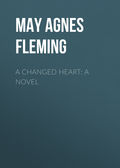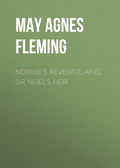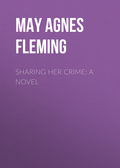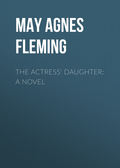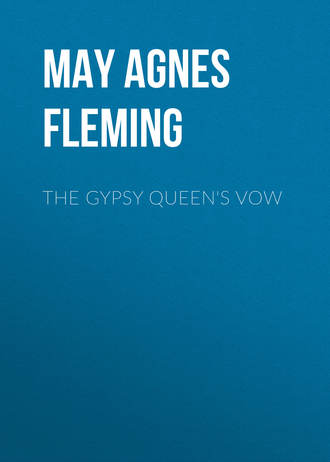
May Agnes Fleming
The Gypsy Queen's Vow
“During the next week, I scarcely ever left the cottage; and when she was sufficiently recovered to use a pen, she wrote a few lines to the principal of the academy, saying she had gone to visit a friend, and would not return for a fortnight, at least. As she had ever been a petted child, accustomed to go and come unquestioned, her absence excited no surprise or suspicion; and secreted in the cottage, she remained for the next two weeks. How the old woman managed to conceal the child I know not; but certain it is, she did it.
“The time I had dreaded came at last. My better nature had awoke since the birth of my child; and I resolved to tell her all, cost what it might, and set her free. Mother, you can conceive the bitter humiliation such a confession must have been to me – yet I made it. I told her all; how basely I had deceived her; how deeply I had wronged her. In that moment, every spark of love she had ever felt for me was quenched forever in her majestic indignation, her scorn, and utter contempt. Silently she arose and confronted me, white as the dead, superb in her withering scorn, as far above me as the heavens from the earth. All the pride of her proud race swelled in her breast, in a loathing too deep and intense for words. But those steady, darkening eyes, that seemed scintillating sparks of fire, I will never forget.
“‘Here we must part, then, Reginald Germaine; and on this earth we must never meet again!’ she said, in a voice steady from its very depth of scorn. ‘Of the matchless wrong you have done me, I will not speak; it is too late for that now. If one spark of the honor you once professed still lingers in your breast, be silent as regards the past. I ask no more. You have forever blighted my life; but the world need never know what we once were to each other. If money is any object’ – and her beautiful lip curled with a contempt too intense for words – ‘you shall have half my wealth – the whole of it, if you will – if it only buys your silence. I will return to school, and try to forget the unutterable degradation into which I have sunk. You go your own way, and we are strangers from henceforth!’
“Mother! mother! such was our parting; in scorn and hatred on one side; in utter despair and undying remorse on the other. That day she returned to school; I fled, to drown thought in the maddening whirl and tumult of London; and we have never met since. She is unmarried still, and the reigning belle of every gilded salon in London; but I know she never will, never can, forget the abyss of humiliation into which I dragged her down. For her sake, to injure her happiness, I would willingly end this wretched existence, but that I must live for what is so dear to the gipsy heart – revenge! With all her lofty pride, what she will feel in knowing she is the wife of a convicted felon, God and her own heart alone will ever know.”
He threw himself into a seat, and shading his face with his hands, sat silent; but the convulsive heaving of his strong chest, his short, hard breathing, told, more than words could ever do, what he felt at that moment. And still the dusky shadow in the duskier corner sat silently glaring upon him with those red, lurid eyes of flame.
“To tell you this story, to commit my child to your charge, I wished to see you to-night, mother,” he said, at last, without looking up. “She does not dream of its existence; she was told it died the hour of its birth, and was buried while she was still unconscious. In this pocketbook you will find the address of the woman who keeps it; tell her the count – for as such she knows me – sent you for it. Take it with you to Yetholm, mother; try to think it is your son, Reginald, and forget the miserable convict whom you may never see more.”
Still no reply, but oh, the fixed, burning gaze of those spectral eyes of fire!
“Mother, you must leave me now,” he said, lifting his head, and looking sorrowfully in her rigid, haggard face; “for the few hours that are left me, I would like to be alone. It is better for us both that we part now.”
“I will not go!” said a voice so hollow, so unnatural, that it seemed to issue from the jaws of death. “I will not go. I defy heaven and earth, and God himself, to tear me from you now.”
“Mother, it is my wish,” he said, calmly.
“Yours, Reginald?” she cried, in a voice of unutterable reproach. “You wish that I should leave you? For fifteen years I have given you up, and in one short hour you tire of me now. Oh, Reginald, my son! my son!”
No words can describe the piercing anguish, the utter woe, that rived that wild cry up from her tortured heart.
He came over, and laid his small, delicate hand on hers, hard, coarse, and black with sun, wind and toil.
“Listen to me, my mother!” And his low, calm, soothing tones were in strong contrast to her impassioned voice. “I am not tired of you – you wrong me by thinking so; but I have letters to write, and many matters to arrange before to-morrow’s sun rises. I am tired, too, and want to rest; for it is a long time since sleep has visited my eyes, mother.”
“Sleep,” she bitterly echoed; “and when do you think I have slept. Look at these sunken eyes, this ghastly face, this haggard form, and ask when I have slept. Think of the mighty wrong I have suffered, and ask when I shall sleep again.”
“My poor, unhappy mother!”
“He can sleep,” she broke out, with a low, wild laugh. “Oh, yes! in his bed of down, with his princely son under the same roof, with menials to come at his beck, he can sleep. Yes, he sleeps now! but the hour comes when that sleep shall last forever! Then my eyes may close, but never before!”
“You are delirious, mother; this blow has turned your brain.”
She rose to her feet, her tall, gaunt form looming up in the shadowy darkness; her wild black hair streaming disheveled down her back; her fierce eyes blazing with demoniacal light, one long, bony arm raised and pointing to heaven. Dark, fierce and stern, she looked like some dread priestess of doom, invoking the wrath of Heaven on the world.
“Delirious, am I?” she said, in her deep, bell-like tones, that echoed strangely in the silent cell. “If undying hate, if unresting vengeance, if revenge that will never be satiated but by his misery, be delirium, then I am mad. I leave you now, Reginald, such is your command; and remember, when far away, you leave one behind you who will wreak fearful vengeance for all we have both suffered.”
“Mother, Lord De Courcy is not so much to blame after all, since he believes me guilty. I am not alarmed by your wild threats; for I know, in the course of time, this mad hate will grow less.”
“Never – never!” she fiercely hissed through her clenched teeth. “May God forget me if I ever forget my vow! Reginald, if I thought that man could go to heaven, and I by some impossibility could be saved, too, I would take a dagger and send my soul to perdition, sooner than go there with him.”
Upturned in the red light of the lamp, her face, as she spoke, was the face of a demon.
“Strong hate, stronger than death!” he said, half to himself, as he gazed on that fiendish face. “Farewell, then, mother. Will you fulfill my last request?”
“About your child? – yes.”
“Thank you, dearest mother. If so lost a wretch as I am dare invoke Heaven, I would ask its blessings on you.”
“Ask no blessing for me!” she fiercely broke in. “I would hurl it back in the face of the angels, did they offer it.”
Folding her mantle around her, she knotted the handkerchief, that had fallen off, under her chin, and stood ready to depart. The young man went to the door, and knocked loudly. A moment after, the tramp of heavy feet was heard in the corridor approaching the door.
“It is the jailer to let you out. Once more, good-by, mother.”
She was hard, and stern, and rigid now; and there were no tears in her dry, stony, burning eyes, as she turned to take a last farewell of the son she idolized – the son she might never see again. His eyes were dim, but her tears were turned to sparks of fire.
Without a word she pressed one hot, burning kiss on his handsome brow; and then the door opened, and she flitted out in the darkness like an evil shadow. The heavy door again swung to; the key turned in the lock; the son was alone in his condemned cell; and the maniac mother, out once more in the beating rain and chill night wind, was lost in the great wilderness of mighty London.
CHAPTER VII.
THE MOTHER’S DESPAIR
“Go, when the hunter’s hand hath wrung
From forest-cave her shrieking young,
And calm the lonely lioness —
But soothe not, mock not, my distress.”
– Byron.
Away through the driving storm – through the deepening darkness of coming morn – through the long, bleak, gusty streets – through alleys, and courts, and lanes; whirled on like a leaf in the blast that knows not, cares not, whither it goes, sped the gipsy queen Ketura. There were not many abroad at that hour; but those she passed paused in terror, and gazed after the towering form, with the wild face and wilder eyes, that flew past like a lost soul returning to Hades. She stood on London bridge, and, leaning over, looked down on the black, sluggish waters beneath. Many lights were twinkling here and there upon the numerous barges rising and falling heavily on the long, lazy swell, but the river elsewhere lay wrapped in the blackness of Tartarus. One plunge, she thought, as she looked over, and all this gnawing misery that seems eating her very vitals might be ended forever. One hand was laid on the rail – the next moment she might have been in eternity; but with the rebound of a roused tigress she sprung back. Was it the thought of standing before the judgment-seat of God with all her crime on her soul – of the long eternity of misery that must follow – that appalled her? No, she would have laughed in scorn at these, but the remembrance of her vow, of her oath of vengeance, restrained her.
“No; I will live till I have wrung from his heart a tithe of the misery mine has felt,” she thought; and then a dark, lowering glance on the black, troubled waters below filled up the hiatus.
Dusky forms, like shadows from the grave, were flitting to and fro, brushing past her as they went. Restlessly they flew on, as if under the friendly mantle of darkness alone they dared leave their dens. She knew who they were – the scum, the offcasts, the street-walkers of London; and she wondered vaguely, as she caught fitful glimpses of wild, pale faces, that gleamed for an instant in the light of the lamp, and then were gone, if any of them had ever felt anguish like to hers. While she stood clutching the parapet, a female form, in light, flowing garments, was borne on, as if by the night wind, and stood gazing down into the gloomy waters beside her. One fleeting glimpse she caught of a pale young face, beautiful still, despite its look of unutterable woe; and then, with a light rustle, something went down, far down, into the waves beneath. There was a sullen plunge, and the gipsy queen leaned over to see. By the light of one of the barge lamps she saw a darker shadow rise through the darkness to the surface. For an instant that white, wild face glared above the black bosom of the Thames, and then disappeared forever; and with a hard, bitter smile, terrible to see, the dark, dread woman turned away.
Away, again, through the labyrinth of the city, leaving that “Bridge of Sighs” far behind – away from the dark dens and filthy purlieus to the wider and more fashionable part of the town, sped the gipsy queen. There could be no rest for her this last sorrowful night; as if pursued by a haunting demon she fled on, as if she would escape from the insufferable misery that was gnawing at her heart; seeking for rest, and finding it not. Clutching her breast fiercely at intervals with her dark, horny fingers, as if she would tear thence the anguish that was driving her mad, she still flew on, until once again she found herself before the brilliantly lighted mansion of Earl De Courcy. Swelling on the night air, came borne to her ear strains of softest music, as if to mock her misery. Gay forms went flitting past the windows, and, at intervals, soft musical peals of laughter mingled with the louder sounds of gayety. Folding her arms over her breast, the gipsy leaned against a lamp-post, and looked, with a steady smile, up at the illuminated “marble hall” before her. Her commanding form, made more commanding by her free, fiery costume, stood out in bold relief, in the light of the street-lamp. Her dark face was set with a look fairly terrific in its intensity of hate. And that smile curling her thin, colorless lips – Satan himself might have envied her that demoniacal smile of unquenchable malignity!
Moving through his gorgeous rooms, Earl De Courcy dreamed not of the dark, vengeful glance that would, if it could, have pierced those solid walls of stone to seek him. And yet ever before him, to mar his festivity, would arise the haunting memory of that convulsed face, those distended eye-balls, those blanched lips, those upraised hands, pleading vainly for the mercy he could not grant. Amid all the glitter and gayety of the brilliant scene around him, he could not forget the pleadings of that strong heart in its strong agony. He thought little of her threats – of her maledictions; yet, when some hours later he missed his son from the gay scene, dark thoughts of assassination – of the unfailing subtle poisons gipsies were so skilful in, arose before him; and he shuddered with a vague presentiment of dread. But his son had returned safe; and now the stately old nobleman stood gayly chatting with a bevy of fair ladies, who clustered round him like so many gay, glittering, tropical butterflies.
“Oh! she was positively the most delightful old thing I ever saw!” exclaimed the gay voice of gay little Miss Clara Jernyngham. “Just like ‘Hecate’ in ‘Macbeth,’ for all the world – the very beau ideal of a delightful Satanic old sorceress! I would have given anything – my diamond ring, my French poodle, every single one of my lovers, or even a ‘perfect love of a bonnet’ – to have had her tell my fortune. I fairly dote on all those delightfully-mysterious, enchanting, ugly old gipsies who come poking round, stealing and telling fortunes. What in the world did she want of you, my lord?”
A shadow fell darkly over the brow of the earl for a moment, as he recollected that dark, impassioned woman pleading for her only son; but it passed away as quickly as it came, and he answered, with a smile:
“To tell my fortune, of course, little bright-eyes. Am I not an enviable man?”
“And did she really tell it? Oh, how delightful! What did she say, my lord?”
“That I was to propose to Miss Clara Jernyngham, who was to say, ‘With pleasure, my lord!’ – that I was to indulge her with ‘loves of bonnets’ and French poodles to an unlimited extent – that – ”
“Now, I don’t believe a word of it,” said Miss Clara, pouting, while a peal of silvery laughter arose from the rest. “I wouldn’t be a mere countess at any price. I’ll have a ducal coronet, if I die for it! You know the old Duke of B – , my lord!” she added, in a mysterious whisper. “Well, he is not quite right in his mind, poor man! and I am going to propose to him the very first chance! The family diamonds are superb, and I will become them beautifully, you know! This is strictly entre nous, though; and if you don’t tell, my lord, you shall have an invitation to the wedding, and drink my health in his grace’s old wine!”
And, with her pretty little face all dimpled with smiles, Miss Clara danced away to a window near, and, lifting the heavy curtains, peeped out.
The earl had bowed, and, with his hand on his heart, had promised, with befitting gravity, to preserve the young lady’s secret inviolate, and was now turning away, when a sudden ejaculation from Miss Clara’s rosy lips brought him again to her side.
“Oh, my lord! only look!” she cried, in a breathless whisper, pointing out. “There is that dark, dreadful gipsy we were talking of, herself. Only look at that awful face; it is positively enough to make one’s blood run cold. Could she have heard us, do you think, my lord?”
At any other time, the gay little lady’s undisguised terror would have amused the earl; but now, with that dark, stern, terrible face gleaming like a vision from the dead, in the fitful light of the street-lamp, he felt his very blood curdle. It rose before him so unexpectedly, as if she had risen from the earth to confront him, that even his strong heart grew for a moment appalled. Her tall form looming up unnaturally large in the uncertain light; her unsheltered head, on which the rain mercilessly beat; her steady, burning, unswerving gaze fixed on the very window where they stood – all combined, sent a thrill of terror, such as in all his life he had never felt before, to the very heart of the earl.
She saw them as they stood there; for by the brilliant jets of light, his imposing form was plainly revealed in the large window. Slowly, like an inspired sibyl of darkest doom, she raised one skinny hand, and, while her long, flickering finger pointed upward, her ominous gaze never for a single instant wandered from his face. So wild, so threatening was her look, that the shriek she had opened her mouth to utter, froze on little Miss Jernyngham’s lips; and the earl, with a shudder, shaded his eyes with his hands to shut out the weird sight. One moment later, when he looked again, the dark, portentous vision was gone, and nothing met his eye but the slanting rain falling on the wet, glittering pavement.
Slowly and reluctantly, as though unwilling to go, the clouds of night rolled sullenly back, and morning, with dark, shrouded face and dismal fog, broke over London.
The crash, the din, the surging roar of busy life had commenced. The vast heart of the mighty Babel was throbbing with the unceasing stream of life. Men, looking like specters, in the thick, yellow fog, buttoned up in overcoats, and scowling at the weather, passed up and down the thronged thoroughfares. On the river, barges, yachts and boats ran against each other in the gloom, and curses, loud and deep, from hoarse throats, mingled with peals of gruff laughter, from crowds of rowdy urchins on the wharves, who, secure in their own safety, seemed hugely to enjoy the discomfiture of their fellow-heathens. The dark bosom of the sluggish Thames rose and fell calmly enough, telling no tales of all the misery, woe and shame hidden forever under its gloomy waves.
A large, black, dismal-looking ship lay moored to one of the docks, and a vast concourse of people were assembled to witness the crowd of convicts who were to be borne far away from “Merrie England” in her, that morning. Two-by-two they came, chained together hand and foot, like oxen; and the long, gloomy procession wound its tortuous way to the vessel’s side, amid the laughter, scoffs and jeers of the crowd. Yet there were sad faces in that crowd, too – faces hard, rough and guilt-stained – that grew sorrowful as better men’s might have grown, as some friend, son, husband or brother went by, straining their eyes to take a last look at the land they were leaving forever. Now and then, some fair young face scarcely past boyhood would pass in the felon gang – faces hard to associate with the idea of guilt; but most were dark, savage, morose men, with scowling eyes and guilt-hardened looks – men inured to crime from their very infancy, and paying crime’s just penalty now.
At last came one who was greeted with an insulting cheer that rung to the very heavens. And “Hurrah! for the gentleman gipsy!” “Hurrah! hurrah! for the thief from Eton!” rung out again and again, until the welkin rung.
Proudly erect, with his fine head thrown back; his full, falcon eyes flashing with a scorn that made more than one scoffing gaze fall, walked the son of the gipsy queen.
Shout after shout of derision greeted him as he went on; for the rabble ever hate those who, belonging to their own class, raise themselves above them. But when a woman – a wild, haggard, despairing woman – rushed through the crowd, and greeted him with the passionate cry: “My son! oh, my son! – my son!” a silence like that of death fell over the vast throng. Unheeding all around her, the gipsy Ketura would have forced her way to his side; but she was held back by those who had charge of the convicts. And the dreary procession passed on its way.
All were on board at last; and the vessel, with a fair wind, was moving away from the wharf. The crowd was dispersing; and the officer, at last, who was guarding Ketura, moved away with the rest, casting a compassionate glance on the face white with woman’s utmost woe.
Standing there, with straining eyeballs and clenched hands, the wretched woman watched the ship that bore away the son she so madly loved. A sort of desperate hope was in her heart; still, while it remained in sight, something might intervene to restore him yet. With parted lips and heaving breast, she stood there, as any other mother might stand, and watched the sods piled over her child’s grave; and still she would not believe he had gone forever. At last the vessel disappeared; the last trace of her white sails were gone; and then, with a terrific shriek that those who heard might never forget, she threw up both arms, and fell, in strong convulsions, to the ground.



